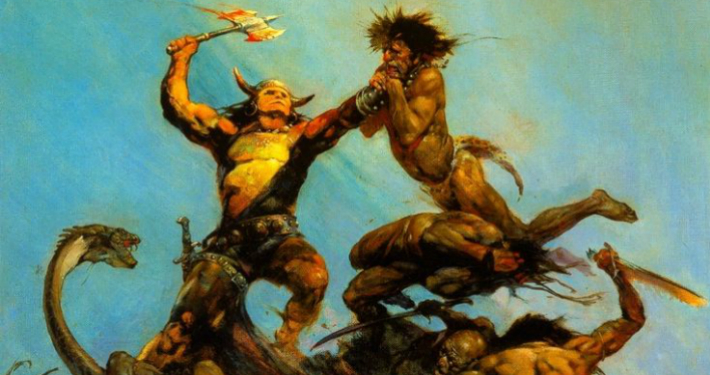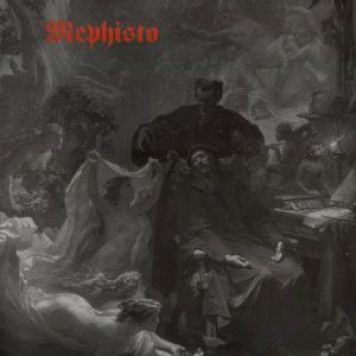Sepulcrustacean’s Cold Steel Dawn: Hidden Warriors of Melodic Metal

When it comes to obscure and underground metal, generally death and black dominate due to how both genres and their subforms flourished in the 90’s and onwards. However with the rise of the neo-traditional heavy metal movement, there’s been renewed interest in the hidden corners of the more melodic end of the spectrum. You know the big ones – Manilla Road, Cirith Ungol, Helstar, Liege Lord, Scanner – now we delve deeper. This is the Cold Steel Dawn.
Mephisto – Mephisto (1988, Rockport Records)

In the wake of the post-Helloween paradigm shift of power metal from an American style to a European one, many of the first primarily German practitioners hadn’t quite jumped on the sugary-and-sweet train with which the genre is nowadays associated. Even compared to fellow Germans like Crows and Scanner, Krefeld’s Mephisto were one monstrously riffy band. Streamlined single string picked rhythms are aplenty, but they’re backed up by a meaty analog production job and an aggressive thrash-tinged attack similar to what American power metal bands like Helstar and Attacker were going for increasingly after 1985. This album is rather short at seven songs, one of which is a mood-setting intro, but there’s a good deal of variety in each one with an eye for grandiose song construction. Both instrumental tracks highlight this expertly, with poetic lead guitar laced through some challenging harmonies soaring over storming percussion and at times outright savage riffing, even moments of almost prog like solemn reflection. Uew Suerick’s strong accent and amateur vocal phrasing may be a barrier to some, but this presumably unintentional off-kilter approach only adds to its charm, tempering impressive musical capacity with fiery eagerness. This is in a way Euro-style power metal for American traditionalists, though those who can appreciate early Blind Guardian and Scanner may dig this as well.
Ars Nova – Transi (1994, Made in Japan Records)
Many fairly criticize power, symphonic, and certain older forms of progressive metal for having their keyboards drown out everything else. So if we cut said keyboardsplosions out by roughly 50%, shipped the removed parts to the doorsteps of Rick Wakeman and Emerson, Lake, & Palmer then asked both to warp back in time to the 90’s to use them to help compose the soundtracks of the classic Castlevania games, Ars Nova is probably what it would sound like. This is essentially the antithesis of handlebar moustache stroking take-us-seriously-please “deep” modern prog and instead the best parts of late-night SNES nostalgia on ‘roids. Whatever mellow moments there are, well timed and setting the campy horror atmosphere wonderfully, are swallowed up by gigantic textures of what sounds like whole album’s worth of keyboard solos rupturing at the seams with colour and energy. Inevitably this can make the album somewhat hard to follow with just the raw volume of melody lines avalanching toward your eardrums. However it’s carried well by energy and sheer colourfulness alone with its grand arching melodies and colossal, highly theatrical motions along with many choice keyboard tones that would not be out of place in the old Final Fantasy or Super Mario games. You’re getting a fancy three course meal’s worth of variety either way.
Alhambra – Fadista (2007, Planet)
To use an incredibly wide brush stroke, most Japanese power metal sounds like the lovechild of Sonata Arctica, Yngwie Malmsteen, and Judas Priest entering a Dragon Ball Z style showdown with the Fist of the Northern Star or Fate series soundtracks which can be awesome sometimes. Alhambra can’t be said to *completely* buck this but there is a lot of 70’s progressive rock a la Genesis and Yes present in their sound, something not completely alien to the genre but rarely this well realized or overtly present. While this is less proggy than their debut, 2005’s A Far Cry to You, which received an excellent rerecording in 2013, it does keep the noodling more strictly directed into just the right amount of high flying power metal exuberance. The riffing is heavily chorded, using the broad strokes of crunchy semi Rainbow inspired sections or longer, winding harmonies capped off with some gorgeous lead licks to help buffer charmingly antiquated organ-heavy synths as the shrill, piercing voice of Junko brings these blossoming melodies to explosive heights. It’s a high degree of complexity even for the already competitive prog/power style on songs like the title cut, “Utopia”, and the 11 minute showstopper “Die Walküre”, but their grasp of dynamics is evident in how they carefully section these heavily engineered monster tracks, sometimes suspending most of the metal parts for short interludes, more demanding moments of instrumental interplay, and in one case even almost flamenco sounding portions. Sadly it doesn’t sound like they’ll ever reclaim this level of compositional thoroughness based on the two succeeding albums. Regardless, whether you swear by Images and Words, Selling England by the Pound, V: The New Evolution Suite, or Close to the Edge, this album will accompany any of them nicely.
Ordalia – Return of the King [Reissued/Remastered] (2014 , Barbarian Wrath)
Epic heavy/doom metal tends to come in two forms; the big and riffy tried and true approach of Solstice, Atlantean Kodex, Gatekeeper, Doomsword, debut era Domine (Italy), Eternal Champion, and Battleroar, or the bizarre 70’s influenced sorcerers like Manilla Road, Dark Quarterer, Cirith Ungol, Longings Past, Root (Czech Republic), and Seasons of the Wolf. Italy’s Ordalia fall into the latter camp, in particular resembling later Manilla Road’s doomy grandeur and mammoth rhythmic gait with the strange 70’s jammy psych/prog/hard rock eccentricity of groups like Legend and the previously mentioned Cirith Ungol circa King of the Dead. The approach is pulpy, colossal in scope but elaborately detailed with riffs the size of Conan the Barbarian’s broadswords and battleaxes juxtaposed with digressions into semi-technical/proggy moments where snaking melodies can play out and the bass can more clearly comment on the asymmetrical compositions. At times it can resemble a jam session, but these Italians have enough earthshaking riffs and heroic vocal lines narrating these nine tales of pulpy fantasy and valour to make you want to pick up your spear and go stab some antediluvian beasts in the far off ruins of Hyperborea. Do note that this remaster does change the track ordering of the original 2000 version and removes two songs, the hard rocker “All I Ask (When I Pray)” and semi jaunty “Mystic Isle of Avalon,” though I personally thought both should’ve stayed on the drawing board. The new production job is also more echo-y and distant sounding so listening to the album is akin to hearing the approaching din of some massive army marching towards you. Bring out the Stormbringer, slam this into the sound system, and go slay some Three Inches of Blood fans.
Masquerader – Vortex Day Zero (2016, Independent)
Taiwan is not the first place we think of when we think of thrash, even more if we’re talking the bizarre Mekong Delta and Deception Ignored era Deathrow stuff, which brings us to this under-appreciated weirdo of an album. It’s undeniably a thrash record but with lots of lopsided harmonies and twitchy rhythms, akin to flickering, jarring haywire radio signals and malfunctioning spidery robot limbs. It can actually be fairly aggressive, but the band is incredibly averse to having any semblance of normal rhythms or pure straightforward aggression, frequently entering psychedelic breaks and interjecting dissonant licks into stuttering chords as they fracture and dissect any illusion of certainty and easily headbangable portions. Tracks like “Second Guessing” and “A Minute Past Midnight” drop thrash entirely for disorienting ventures into pure prog territory that resemble recent Voivod at their most abstract, simply letting their adventurous un-melodies and Pink Floyd influences drift freely. The vocal performance, which is what I imagine a shorter and more psychotically screechy ESL version of James Hetfield would sound like, manages to fit by virtue of being about as surreal as the music surrounding it and even has a moment to shine in the seven minute ambient-tinged ballad “Dream Escape”. Sadly, Masquerader disbanded afterwards. Put down those Vektor and Revocation albums and grab this.
(Photo VIA Frank Frazetta)











